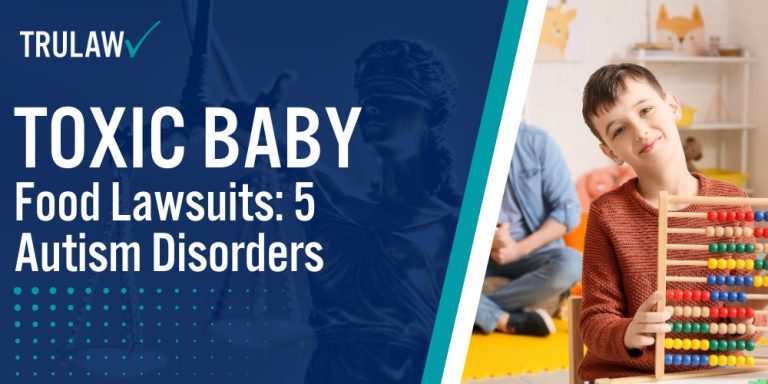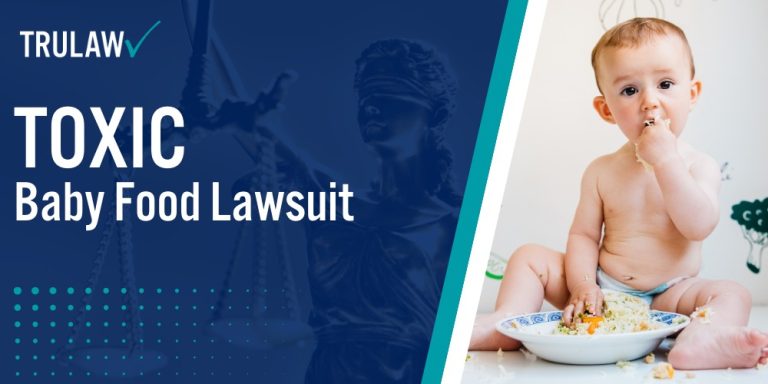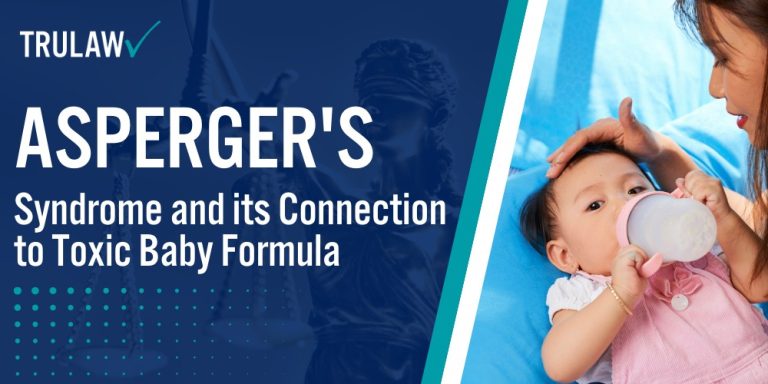Toxic Baby Food Brands Linked to Heavy Metal Contamination
- Last Updated: July 9th, 2024

Attorney Jessie Paluch, founder of TruLaw, has over 25 years of experience as a personal injury and mass tort attorney, and previously worked as an international tax attorney at Deloitte. Jessie collaborates with attorneys nationwide — enabling her to share reliable, up-to-date legal information with our readers.
Legally Reviewed
This article has been written and reviewed for legal accuracy and clarity by the team of writers and legal experts at TruLaw and is as accurate as possible. This content should not be taken as legal advice from an attorney. If you would like to learn more about our owner and experienced injury lawyer, Jessie Paluch, you can do so here.
Fact-Checked
TruLaw does everything possible to make sure the information in this article is up to date and accurate. If you need specific legal advice about your case, contact us by using the chat on the bottom of this page. This article should not be taken as advice from an attorney.
Key takeaways:
- Several major baby food manufacturers, including Beech-Nut Nutrition Company, Hain Celestial Group, Earth's Best Organic, Gerber, and Nurture Inc., are facing lawsuits for allegedly selling products containing dangerous amounts of heavy metals like arsenic, lead, cadmium, and mercury.
- Baby food autism lawsuits are seeking compensation for families, with settlement amounts ranging from $500,000 to $1.5 million per claimant, based on factors such as the severity of autism, extent of exposure to toxic metals, medical expenses, and impact on the family's lifestyle and financial stability.
- Scientific research suggests a possible link between heavy metals in baby food and an increased risk of autism spectrum disorders (ASD). High-risk products include infant rice cereal, sweet potatoes, fruit juices, carrot purees, and pea purees.
Overview of Baby Food Brands Facing Lawsuits Over Heavy Metals
On this page, we’ll discuss an overview of the toxic baby food brands under scrutiny for heavy metals, legal action over heavy metal contamination in baby food brands, what baby food is linked to Autism, and much more.
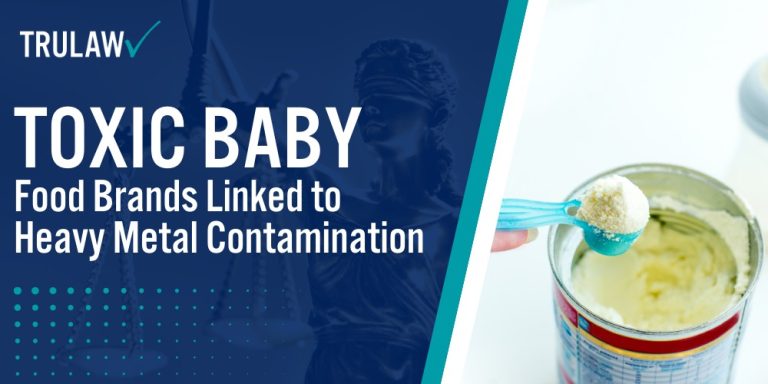
Introduction to Toxic Baby Food Brands and Lawsuits
Key points from the toxic baby formula lawsuits include, but are not limited to:
- Multiple Brands Involved: Companies such as Gerber, Beech-Nut, and HappyBABY are facing legal challenges.
- Types of Metals: Common heavy metals found include arsenic, lead, cadmium, and mercury.
- Health Concerns: These metals are linked to several health risks including autism disorders in children.
- Legislative Action: The Baby Food Safety Act of 2024 aims to set maximum allowable limits for these toxic metals.
If your child has been diagnosed with autism or other developmental issues after consuming toxic baby food, you may be entitled to compensation.
Contact TruLaw today using the chat on this page to receive an instant case evaluation.
Table of Contents
Toxic Baby Food Manufacturers Implicated in the Lawsuits
Several major baby food manufacturers are facing lawsuits for selling products that contain allegedly dangerous amounts of heavy metals.
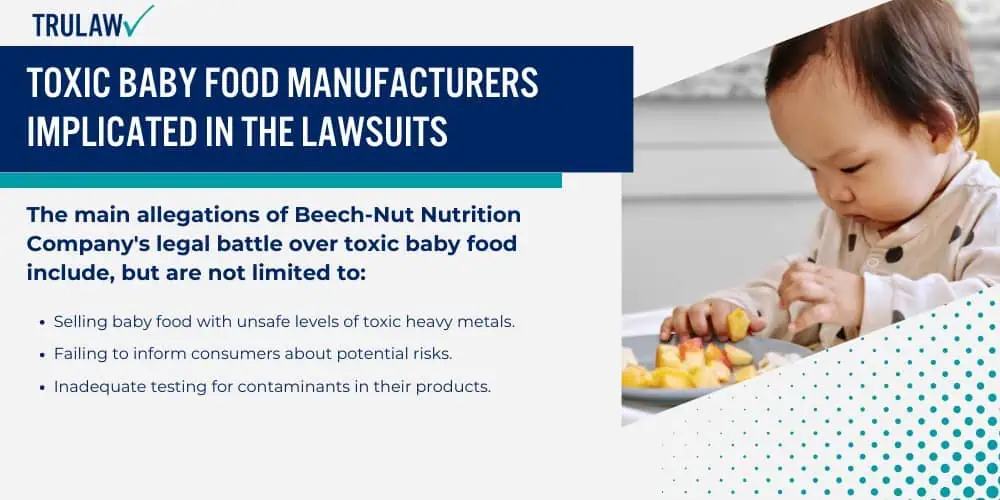
Below are the key points on the legal battles each company is involved in.
Beech-Nut Nutrition Company’s Legal Battle Over Toxic Baby Food
Beech-Nut Nutrition Company faces allegations of heavy metal contamination in its baby food products.
The lawsuits claim that the company failed to adequately test for and disclose the presence of harmful substances like arsenic, lead, and cadmium in its foods.
The main allegations of Beech-Nut Nutrition Company’s legal battle over toxic baby food include, but are not limited to:
- Selling baby food with unsafe levels of toxic heavy metals.
- Failing to inform consumers about potential risks.
- Inadequate testing for contaminants in their products.
These allegations have raised significant public concern, prompting further investigations into the company’s practices.
Consumers are urged to stay informed about the safety of baby food products.
Hain Celestial Group Legal Issues: Toxic Baby Formula
Hain Celestial Group, known for its organic brands, is under legal scrutiny for its Earth’s Best Organic baby foods.
The legal issues pertain to the presence of toxic heavy metals, which were discovered during independent testing.
Major concerns in Hain Celestial Group’s legal issues related to toxic baby formula include, but are not limited to:
- Toxic heavy metals found in Earth’s Best Organic products.
- Links to negative health impacts in infants, including developmental disorders.
- Claims of false advertising regarding the safety and purity of their organic foods.
These findings have led to a series of lawsuits, calling into question the company’s commitment to consumer safety.
The company is now facing mounting pressure to address these serious allegations.
Earth’s Best Organic Snacks Under Scrutiny for Toxic Baby Formula
Earth’s Best Organic, a Hain Celestial Group brand, has been implicated in lawsuits focusing on their organic snacks.
The claims suggest that these products contain harmful levels of heavy metals, posing risks to infants and young children.
Key points in lawsuits against Earth’s Best Organic snacks include, but are not limited to:
- Presence of unsafe heavy metals in organic snacks.
- Impact on child health and development.
- Lack of adequate disclosure to consumers.
These lawsuits have amplified concerns among parents about the safety of organic baby snacks.
The company is under increased scrutiny to ensure the transparency and safety of their products.
Gerber Lawsuit Concerning Heavy Metals in Baby Food
Gerber, a well-known name in baby food, is embroiled in lawsuits for allegedly selling products contaminated with dangerous heavy metals.
The lawsuits highlight the risks associated with consuming these metals and the company’s failure to test for them adequately.
The Gerber lawsuit concerning heavy metals in baby food includes, but is not limited to:
- Heavy metals like arsenic, lead, and cadmium are found in various products.
- Claims of negligence in ensuring product safety.
- Potential long-term health effects on infants.
These allegations have sparked outrage among consumers, prompting calls for stricter regulations in the baby food industry.
Gerber is now under pressure to enhance its safety protocols and restore consumer trust.
Nurture Inc.Lawsuit for Heavy Metals in Baby Food
Nurture Inc., the maker of HappyBABY products, is facing legal action for similar reasons.
The lawsuits allege that their baby foods contain unsafe levels of toxic heavy metals, putting children at risk of serious health problems.
Allegations in the Nurture Inc. lawsuit for heavy metals in baby food include, but are not limited to:
- Heavy metal presence in HappyBABY foods.
- Risks of developmental issues in children.
- Failure to warn consumers about contamination risks.
The lawsuits against these manufacturers highlight serious concerns over the safety of many baby food products and the need for stringent testing and disclosure to protect consumers.
Baby Food Autism Lawsuit Settlement Amounts: Compensation for Families
Lawsuits involving autism linked to toxic heavy metals in baby food are ongoing.
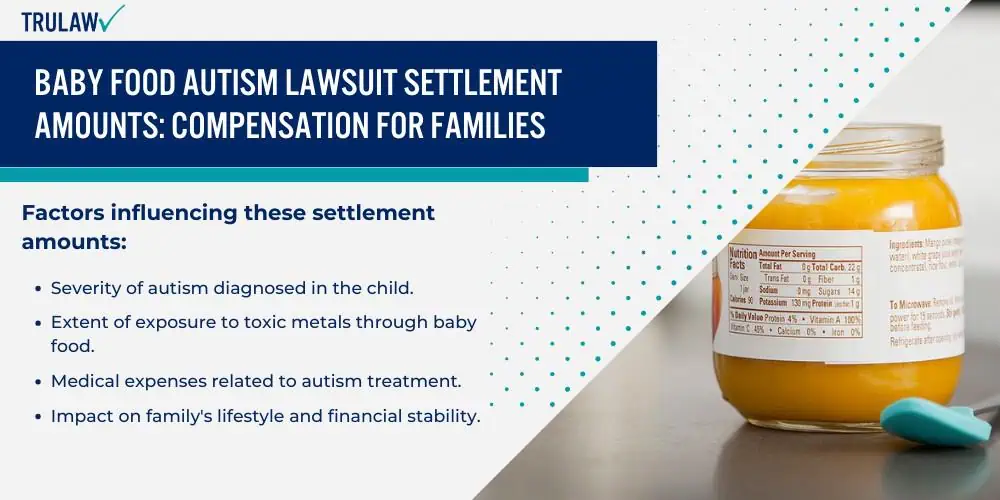
This section examines the range of settlement amounts and the implications for affected families.
Examining Settlement Amounts in Baby Food Autism Lawsuits
Estimated settlement amounts for these lawsuits vary.
Successful cases may see amounts ranging between $500,000 and $1.5 million for each claimant.
This valuation is based on previous similar cases and current legal insights.
Factors influencing these settlement amounts:
- Severity of autism diagnosed in the child.
- Extent of exposure to toxic metals through baby food.
- Medical expenses related to autism treatment.
- Impact on family’s lifestyle and financial stability.
High settlements can set significant precedents for future cases, pushing baby food manufacturers to address the issue more seriously.
Implications for Affected Families and Future Legal Action
Affected families receiving compensation can afford better therapy and care for their children with autism.
Compensation often covers, but is not limited to:
- Medical treatments and long-term healthcare costs.
- Educational support tailored for children with autism.
- Loss of income due to caregiving.
- Emotional distress experienced by the family.
This financial support alleviates some burdens, providing vital resources and opportunities for those impacted.
It also places pressure on baby food manufacturers to improve product safety, potentially reducing future legal actions and sparking more accountability in the industry.
In summary, these settlements provide crucial financial aid and will lead to more stringent regulations on the production of baby foods.
Baby Formula Autism Lawsuit: Holding Manufacturers Accountable
Recent lawsuits have highlighted the alarming connection between certain baby formulas and an increased risk of autism due to heavy metal contamination.
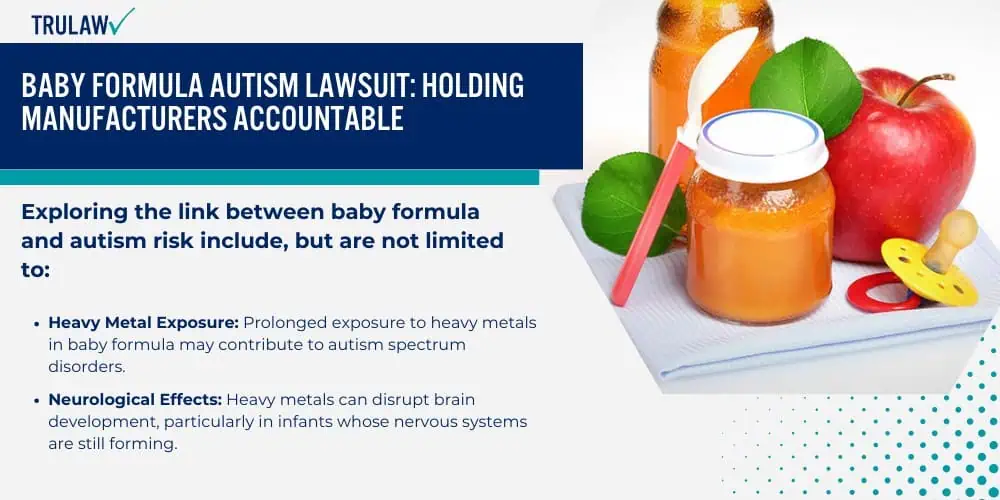
Legal actions are now being pursued to hold manufacturers accountable for these potential health risks.
Exploring the Link Between Baby Formula and Autism Risk
Research shows that some baby formulas contain dangerous levels of heavy metals.
These metals, including arsenic, cadmium, lead, and mercury, have been linked to neurological and developmental issues.
Exploring the link between baby formula and autism risk include, but are not limited to:
- Heavy Metal Exposure: Prolonged exposure to heavy metals in baby formula may contribute to autism spectrum disorders.
- Neurological Effects: Heavy metals can disrupt brain development, particularly in infants whose nervous systems are still forming.
- Studies: Scientific studies have shown a correlation between heavy metal exposure in early childhood and increased risk of autism.
- Brands Involved: Major brands like Gerber, Earth’s Best Organic, and others have been implicated in these findings.
- Consumer Awareness: Increased public awareness has led to more rigorous scrutiny and demands for transparency from baby food manufacturers.
These findings have spurred advocacy for stricter safety regulations in the baby food industry.
Parents and caregivers are increasingly vigilant about the ingredients in baby formulas.
Legal Action Against Baby Formula Manufacturers
Parents of affected children are now taking legal steps to seek justice.
These lawsuits aim to hold manufacturers responsible for the potential harm caused by their products.
Legal trends in the action against baby formula manufacturers show:
- Multidistrict Litigation: Efforts to consolidate cases into multidistrict litigation (MDL) for streamlined pretrial proceedings.
- Customer Loyalty Records: Plaintiffs are using customer loyalty records to verify product purchases.
- Manufacturer Accountability: Companies baby food manufacturers face increasing pressure to address these serious allegations.
- Compensation: Lawsuits seek compensation for medical expenses, pain, and suffering caused by exposure to contaminated baby food.
- Regulatory Changes: There is a growing call for stricter regulatory standards for monitoring and preventing heavy metal contamination in baby foods.
These legal actions are pivotal in protecting public health and ensuring safer products for future generations.
Baby Food Autism Lawsuit Update: Latest Developments and Outcomes
In recent months, there have been significant updates in the litigation involving toxic baby food and its alleged link to autism.
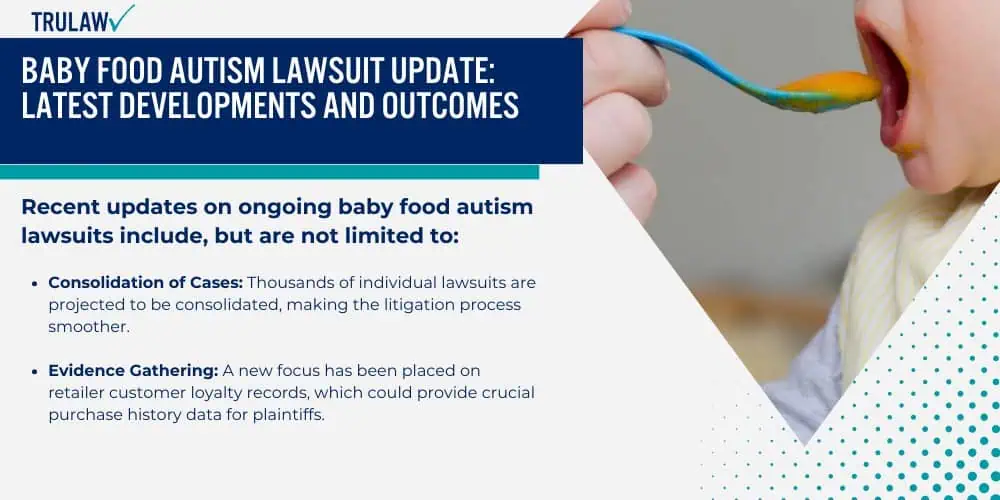
These developments are critical as they impact thousands of families and are the outcome of numerous ongoing lawsuits.
Providing Updates on Ongoing Baby Food Autism Lawsuits
The toxic baby food litigation has seen a substantial increase as more cases are being consolidated.
A motion is currently before the Judicial Panel on Multidistrict Litigation to streamline these lawsuits under one judge.
This aims to make pretrial proceedings more efficient.
Recent updates on ongoing baby food autism lawsuits include, but are not limited to:
- Consolidation of Cases: Thousands of individual lawsuits are projected to be consolidated, making the litigation process smoother.
- Evidence Gathering: A new focus has been placed on retailer customer loyalty records, which could provide crucial purchase history data for plaintiffs.
- State-Specific Trials: California has allowed a case to proceed to trial, indicating that state-level cases may set important precedents.
These developments reflect the growing complexity and importance of these lawsuits.
The outcomes could have significant implications for baby food safety standards nationwide.
Implications for Families Affected by Toxic Baby Food
Families with children affected by the alleged toxic baby food are facing numerous challenges.
The lawsuits address these issues by seeking accountability and compensation from the manufacturers.
Key implications for families affected by toxic baby food include, but are not limited to:
- Medical and Financial Strain: Families are dealing with increased medical expenses and long-term care costs for their children.
- Awareness and Safety: These lawsuits have heightened public awareness about the safety of baby food products and the potential risks involved.
- Future Regulations: Successful outcomes could lead to stricter regulations on baby food production, ensuring safer products for future generations.
These developments highlight the ongoing efforts to ensure safer baby organic food products and provide justice for affected families.
Beech-Nut Lawsuit: Legal Action Over Heavy Metal Contamination
Beech-Nut has faced significant legal challenges due to allegations of heavy metal contamination in its baby food products.
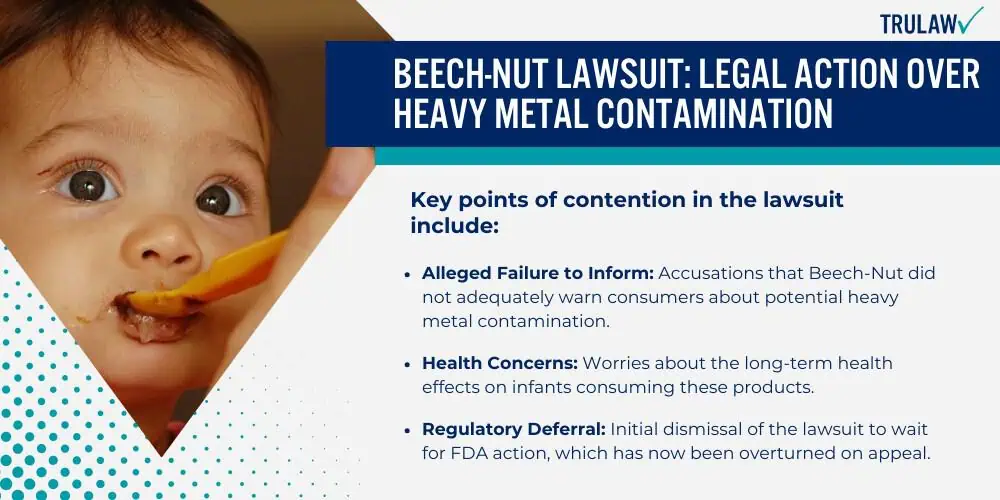
This section explores the lawsuit and its potential impact on the baby food industry.
Examining the Beech-Nut Lawsuit and Its Allegations
The Beech-Nut lawsuit centers around claims that the company failed to disclose the presence of heavy metals in baby foods.
Consumers allege that Beech-Nut’s products contain harmful levels of substances such as lead, arsenic, and mercury.
These allegations gained traction following a 2021 report by a U.S. House of Representatives subcommittee.
The report highlighted toxic levels of heavy metals in products by several baby food manufacturers, including Beech-Nut.
This prompted legal action from concerned parents and consumer groups.
Key points of contention in the lawsuit include:
- Alleged Failure to Inform: Accusations that Beech-Nut did not adequately warn consumers about potential heavy metal contamination.
- Health Concerns: Worries about the long-term health effects on infants consuming these products.
- Regulatory Deferral: Initial dismissal of the lawsuit to wait for FDA action, which has now been overturned on appeal.
- Damages Sought: The plaintiffs are seeking monetary compensation and changes to Beech-Nut’s product safety protocols.
These legal battles underscore the importance of transparency and safety in the baby food industry.
Potential Outcomes and Impact on the Baby Food Industry
The outcome of the Beech-Nut lawsuit could have significant implications for both the company and the broader baby food market.
If Beech-Nut is found liable, they might face substantial financial penalties and be forced to reformulate their products.
Potential outcomes include:
- Financial Implications: Beech-Nut may need to allocate funds for settlements or penalties.
- Policy Changes: New regulations may be implemented industry-wide to reduce heavy metal content.
- Consumer Trust: The lawsuit has already affected consumer perceptions and trust in baby food brands.
- Industry Practices: Other companies may proactively update their safety practices to avoid similar litigation.
- Economic Impact: Potential shifts in market share as consumers gravitate towards brands perceived as safer.
Understanding these potential outcomes helps in grasping the broader impact of this legal action on the baby food industry.
Gerber Lawsuit Autism: Holding the Brand Accountable
Gerber faces significant legal challenges as allegations arise that its baby food products contain harmful levels of heavy metals, potentially linked to autism risk.
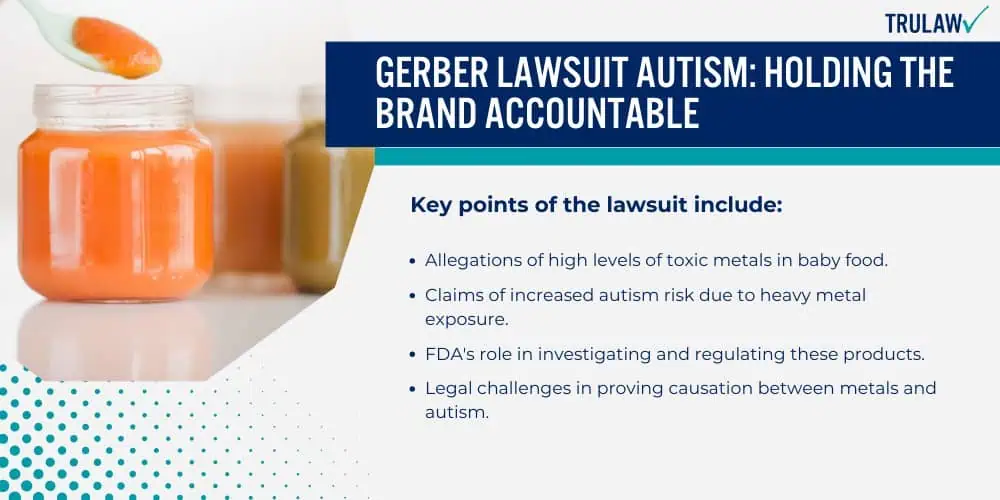
This section expands on these claims and the broader implications for both the baby food company and the baby food industry.
Exploring the Gerber Lawsuit Related to Autism Risk
In recent years, Gerber has been embroiled in lawsuits alleging their baby foods contain toxic heavy metals.
According to claims, these metals may increase the risk of autism in children.
In one notable case, Gerber, alongside other brands, was accused of marketing foods with unsafe metal levels, leading to developmental issues.
The Food and Drug Administration (FDA) has also been scrutinizing these claims, considering tighter regulations on baby foods.
However, proving a direct link between heavy metal exposure and autism remains challenging.
In a recent case, a California judge dismissed the lawsuit against Gerber, citing insufficient evidence linking the metals to autism directly.
Key points of the lawsuit include:
- Allegations of high levels of toxic metals in baby food.
- Claims of increased autism risk due to heavy metal exposure.
- FDA’s role in investigating and regulating these products.
- Legal challenges in proving causation between metals and autism.
Implications for Gerber and the Baby Food Industry
The ongoing legal battles have profound implications for Gerber and the broader baby food industry.
These lawsuits not only affect Gerber’s reputation but also compel the industry to re-evaluate safety standards and transparency with consumers.
Implications for the baby food industry include, but are not limited to:
- Regulatory Changes: Increased scrutiny by the FDA could lead to stricter regulations.
- Brand Impact: Loss of consumer trust can significantly harm Gerber’s market position.
- Industry-Wide Effects: Other brands may face similar lawsuits and need to adjust practices.
- Financial Costs: Legal fees and potential settlements could be substantial.
- Safety Reforms: Companies may need to implement better safety measures to avoid future litigation.
The industry is at a potential turning point, requiring enhanced vigilance and rigorous safety protocols to ensure the well-being of children consuming these products.
Can Heavy Metals in Baby Food Cause Autism: Examining the Evidence
Heavy metals in baby food have raised concerns regarding their potential link to autism spectrum disorders (ASD).
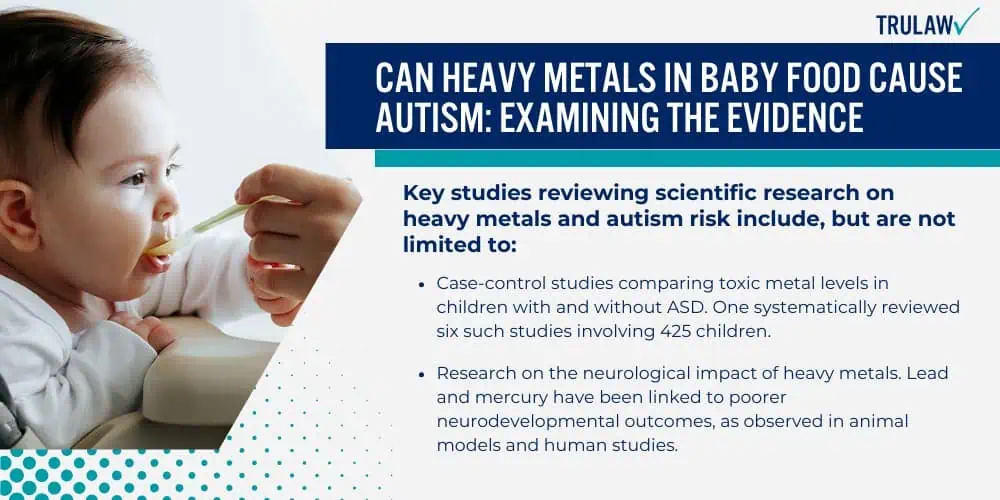
This section scrutinizes the scientific research on this topic and considers the implications for baby food safety and regulation.
Reviewing Scientific Research on Heavy Metals and Autism Risk
Scientific research indicates a possible association between heavy metals and autism risk.
Studies have examined the impact of metals like lead, mercury, and arsenic on neurodevelopment.
Key studies reviewing scientific research on heavy metals and autism risk include, but are not limited to:
- Case-control studies comparing toxic metal levels in children with and without ASD. One systematically reviewed six such studies involving 425 children.
- Research on the neurological impact of heavy metals. Lead and mercury have been linked to poorer neurodevelopmental outcomes, as observed in animal models and human studies.
Researchers found higher levels of heavy metals in ASD-affected children and evidence that prenatal exposure to pollutants might increase autism risk.
Implications for Baby Food Safety and Regulation
The concern over heavy metals in baby food stems from their known neurotoxic effects, especially in young children.
Regulatory bodies are looking into tighter controls on these substances.
Steps being taken include:
- Monitoring and Regulation: The FDA is working on improving the monitoring and regulation of heavy metals in commercial baby foods.
- Alternatives: Encouraging parents to offer soft table foods instead of baby foods, reducing exposure risk.
- Consumer Awareness: Ensuring parents are aware of potential risks and safe feeding practices.
These measures aim to mitigate heavy metal exposure from the food supply, address safety concerns, and protect children’s health.
What Baby Food is Linked to Autism: Identifying High-Risk Products
Certain baby food products have been linked to autism due to the presence of heavy metals.
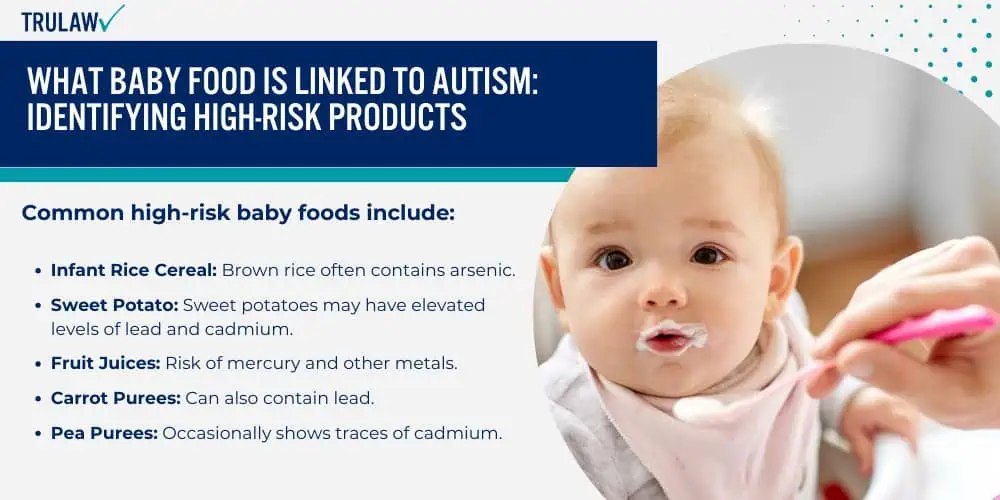
This section will examine high-risk products and provide strategies for minimizing exposure.
Examining Baby Food Products Associated with Autism Risk
Heavy metals such as lead, arsenic, cadmium, and mercury are found in some baby foods.
Repeated exposure to these metals can be harmful to infants’ developing brains.
Among the various homemade baby foods, infant crisped rice cereal cereal and sweet potatoes have shown higher levels of contamination.
Common high-risk baby foods include:
- Infant Rice Cereal: Brown rice often contains arsenic.
- Sweet Potato: Sweet potatoes may have elevated levels of lead and cadmium.
- Fruit Juices: Risk of mercury and other metals.
- Carrot Purees: Can also contain lead.
- Pea Purees: Occasionally shows traces of cadmium.
Parents should be aware of these products as they pose significant risks due to continuous consumption during early development.
The lawsuits against manufacturers like Gerber and Earth’s Best Organic highlight the critical need for monitoring and regulating baby food safety.
Strategies for Minimizing Exposure to Toxic Baby Foods
To minimize the exposure of infants to toxic metals, parents can take several proactive steps.
These measures will help reduce potential harm and ensure safer dietary choices.
Effective strategies include:
- Diversify Diets: Avoid over-reliance on high-risk foods like infant rice cakes and cereals.
- Choose Brands Wisely: Research brands that test products for heavy metals.
- Homemade Foods: Prepare baby foods at home using organic ingredients.
- Check Labels: Look for labels stating “baby foods tested for heavy metals.”
- Limit Juices: Reduce or eliminate canned fruit juices from the diet.
By adopting these strategies, parents can better safeguard their children against the potential neurodevelopmental impacts associated with toxic baby foods.
Careful selection and preparation of baby foods can significantly decrease the risks tied to heavy metal exposures.
Frequently Asked Questions
-
What are the major baby food manufacturers facing lawsuits for toxic heavy metals in their products?
Several major baby food manufacturers, including Beech-Nut Nutrition Company, Hain Celestial Group, Earth’s Best Organic, Gerber, and Nurture Inc., are facing lawsuits for allegedly selling products containing dangerous amounts of heavy metals.
These lawsuits claim that the companies failed to adequately test for and disclose the presence of harmful substances like arsenic, lead, and cadmium in their baby foods.
-
What are the potential settlement amounts for baby food autism lawsuits?
Estimated settlement amounts for baby food autism lawsuits vary, with successful cases potentially seeing amounts ranging between $500,000 and $1.5 million for each claimant.
Factors influencing these settlement amounts include the severity of autism diagnosed in the child, the extent of exposure to toxic metals through baby food, and the impact on the family’s lifestyle and financial stability.
-
What are the implications of the Beech-Nut lawsuit for the baby food industry?
The outcome of the Beech-Nut lawsuit could have significant implications for both the company and the broader baby food market, potentially leading to substantial financial penalties, product reformulations, and industry-wide policy changes.
The lawsuit has already affected consumer perceptions and trust in baby food brands, and other companies may proactively update their safety practices to avoid similar litigation.
-
Is there scientific evidence linking heavy metals in baby food to autism risk?
Scientific research indicates a possible association between heavy metals and autism risk, with studies examining the impact of metals like lead, mercury, and arsenic on neurodevelopment.
While proving a direct link remains challenging, the concern over heavy metals in baby food stems from their known neurotoxic effects, especially in young children.
-
What strategies can parents use to minimize their baby's exposure to toxic heavy metals in food?
To minimize infants’ exposure to toxic metals, parents can diversify their baby’s diet, avoid over-reliance on high-risk foods like infant rice cereal, choose brands that test their products for heavy metals, prepare homemade baby foods using organic ingredients, and limit fruit juices.
Careful selection and preparation of baby foods can significantly decrease the risks tied to heavy metal exposures.

Experienced Attorney & Legal SaaS CEO
With over 25 years of legal experience, Jessie is an Illinois lawyer, a CPA, and a mother of three. She spent the first decade of her career working as an international tax attorney at Deloitte.
In 2009, Jessie co-founded her own law firm with her husband – which has scaled to over 30 employees since its conception.
In 2016, Jessie founded TruLaw, which allows her to collaborate with attorneys and legal experts across the United States on a daily basis. This hypervaluable network of experts is what enables her to share reliable legal information with her readers!
Here, at TruLaw, we’re committed to helping victims get the justice they deserve.
Alongside our partner law firms, we have successfully collected over $3 Billion in verdicts and settlements on behalf of injured individuals.
Would you like our help?
At TruLaw, we fiercely combat corporations that endanger individuals’ well-being. If you’ve suffered injuries and believe these well-funded entities should be held accountable, we’re here for you.
With TruLaw, you gain access to successful and seasoned lawyers who maximize your chances of success. Our lawyers invest in you—they do not receive a dime until your lawsuit reaches a successful resolution!
Do you believe you’re entitled to compensation?
Use our Instant Case Evaluator to find out in as little as 60 seconds!
Camp Lejeune’s water contamination issue spanned several decades starting in the 1950s. Exposure to these chemicals has been linked to various serious health issues, including cancer, organ diseases, and death.
Research is increasingly suggesting a link between the use of Tylenol during pregnancy and the development of neurodevelopmental disorders, such as autism and ADHD, in infants.
Legal action is being taken against manufacturers of Aqueous Film-Forming Foam (AFFF), a chemical used in fighting fires. The plaintiffs allege that exposure to the foam caused health issues such as cancer, organ damage, and birth and fertility issues.
Here, at TruLaw, we’re committed to helping victims get the justice they deserve.
Alongside our partner law firms, we have successfully collected over $3 Billion in verdicts and settlements on behalf of injured individuals.
Would you like our help?
